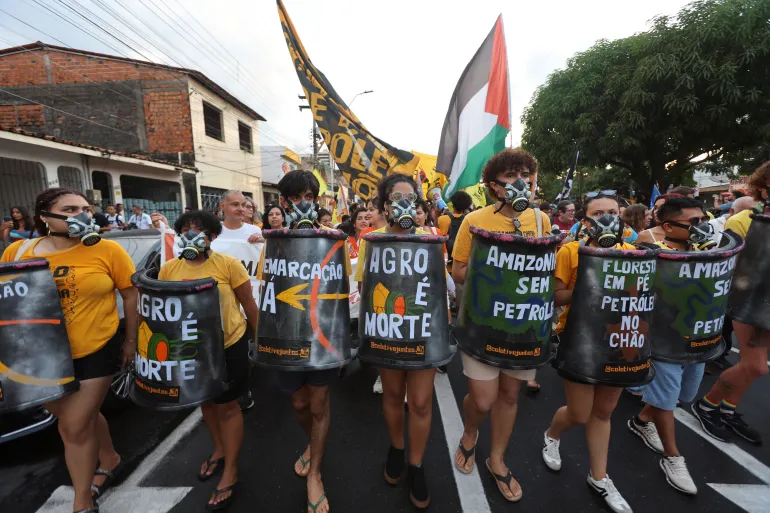
The COP30 climate summit in Belém, Brazil is heading toward a tense finale as nations remain sharply split over the future of fossil fuels, raising fears that the 2025 United Nations Climate Change Conference may conclude without a meaningful agreement. With the two-week summit scheduled to end on Friday, negotiators are struggling to bridge political, economic and ideological divides — and time is running out.
Brazil’s New Draft Excludes Roadmap to Transition Away From Fossil Fuels
A new draft proposal circulated by Brazil on Thursday ignited widespread criticism after it omitted any reference to fossil fuels — a central issue in global climate negotiations. The document includes no roadmap for transitioning away from coal, gas or oil, and no language acknowledging the need to rapidly curb their use.
More than 30 countries across Africa, Asia, Europe, and the Pacific responded by co-signing a forceful letter rejecting the proposal. These nations said they “cannot support an outcome that does not include a roadmap for implementing a just, orderly and equitable transition” away from fossil fuels.
The backlash highlights the deep divisions that have plagued COP30, despite climate advocates’ hopes that this year’s summit would build on the momentum of COP28 in Dubai, where countries first agreed to “transition away from fossil fuels” — though even then the text stopped short of demanding a full phase-out.
Major Powers Block Progress
While an earlier COP30 draft released Tuesday did include the option of creating a transition roadmap, several major fossil-fuel producers and consumers opposed the language. Reports indicate that China, India, Saudi Arabia, and Russia rejected the proposal outright, stalling further progress.
The United States, once a key supporter of a fossil fuel phase-out under President Joe Biden, did not send a delegation this year. President Donald Trump, who returned to office in January, has repeatedly dismissed climate change as a “hoax,” leading to a significant shift in U.S. climate diplomacy.
Climate Finance: Another Major Sticking Point
Beyond fossil fuels, negotiators remain gridlocked over climate finance — the funding required to help vulnerable countries adapt to and recover from climate-related disasters.
Brazil’s new draft calls for tripling global climate finance by 2030, but fails to specify where the money should come from. Historically, wealthy Western nations have resisted paying the bulk of climate adaptation costs, while developing countries argue they have contributed least to climate change but suffer its worst impacts.
With no consensus on responsibility, climate finance risks becoming the issue that derails COP30 entirely.
UN Chief Issues Stark Warning
UN Secretary-General António Guterres, speaking to reporters on Thursday, urged world leaders to confront “disinformation aimed at derailing the transition” away from fossil fuels. He emphasized the stakes for communities already suffering from climate disasters:
“Communities on the front lines are counting flooded homes, failed harvests, lost livelihoods,” Guterres said. “They have heard enough excuses.”
Fire Interrupts Negotiations as Infrastructure Issues Mount
As negotiations dragged on, a fire erupted in one of the COP30 exhibition pavilions on Thursday, prompting the evacuation of thousands of delegates. The blaze spread rapidly inside the building but was extinguished within six minutes.
Nineteen people received treatment for smoke inhalation, but no serious injuries were reported. The incident has drawn attention to ongoing infrastructure problems, including electrical malfunctions and air-conditioning failures, which delegates say have plagued the event.
Protests Demand Indigenous and Environmental Rights
Outside the negotiating halls, thousands of protesters have marched through Belém calling for Indigenous rights, Amazon protection, and a stronger stance against fossil fuels. Many critics say Indigenous voices remain marginalized despite COP30 being hosted in one of the world’s most important rainforest regions.
Talks May Extend Into Weekend
Following the fire, the UN and COP30 leadership issued a joint statement saying the venue was safe and urging delegates to return to negotiations with “solidarity and determination.”
With multiple points of contention unresolved, diplomats warn that talks may extend into the weekend. Whether COP30 ends with a landmark climate agreement or collapses in disagreement now depends on last-minute compromises from deeply divided nations.


Leave a Reply